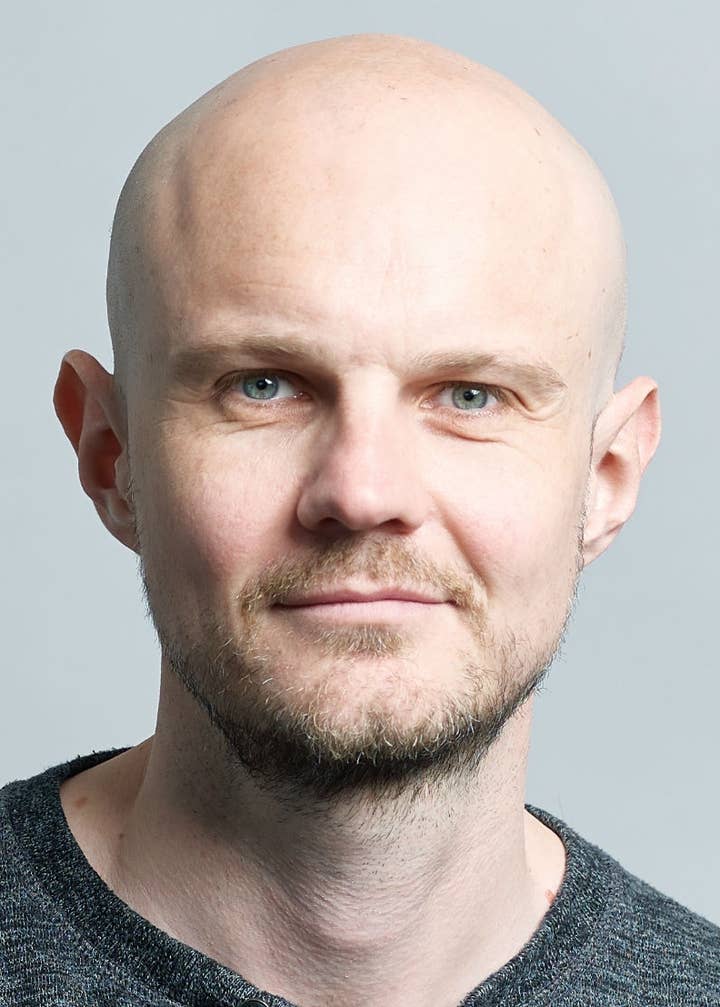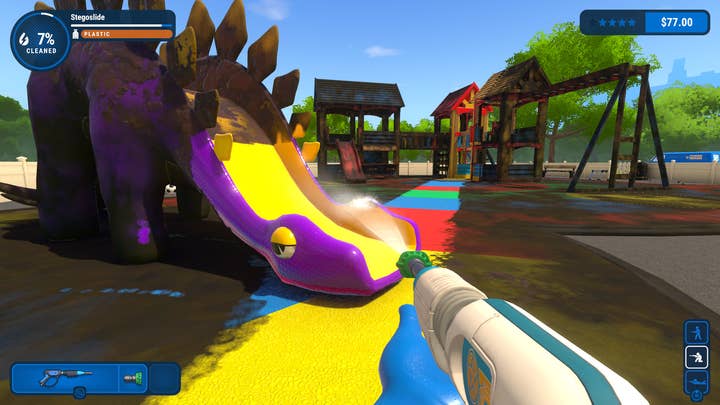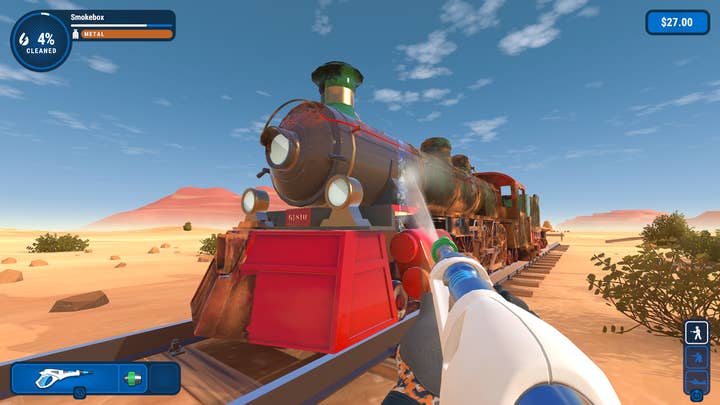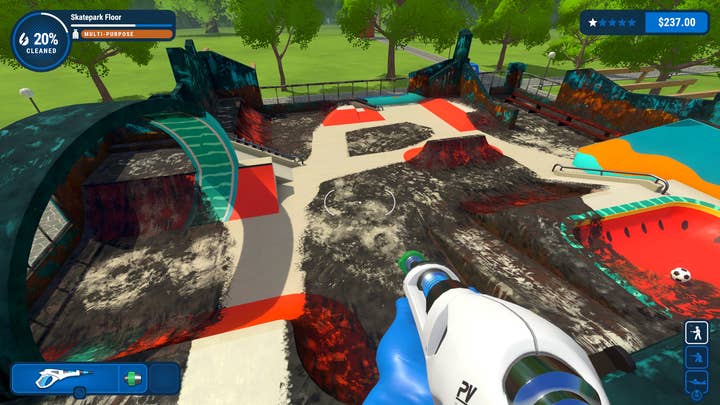The hidden pressure behind PowerWash Simulator
FuturLab founder and CEO James Marsden discusses the game's origins, stepping out of Sony's shadow, and the trials of finding a publisher
PowerWash Simulator is the ultimate ‘Why hasn’t this been done before?’ game. It takes a mundane task that usually leads to a satisfying outcome and gamifies it, removing all of the hurdles of actually doing it in real life.
Futurlab founder James Marsden says that the idea for PowerWash Simulator came from that very ideal: taking something that is calm and soothing to watch, and giving players the tools to do it themselves. But, while the game itself is peaceful and free from antagonism, FuturLab's journey to release an indie hit was much more arduous.
The concept initially came about roughly four years ago, and it was Marsden's wife and business partner Kirsty Rigden that tapped into the core idea first.

"Kirsty noticed that there's always a simulator game in the Steam Top Ten," Marsden tells us. "So she said, 'We should really consider making a simulator game' and I said 'Okay, maybe we'll do that in the future.'"
At the time, FuturLab was working on Peaky Blinders: Mastermind, an adventure puzzle game based on the TV series. But the idea of creating some sort of simulator game was percolating - the team just needed an idea.
Between 2008 and 2018, the cornerstone of FuturLub was working alongside PlayStation to create games for whatever new console the company was about to launch.
"We got into a relationship where whenever they had a new hardware launch coming up, they'd give us a call and say, 'Do you have any ideas?' That was our business for about a decade: making launch titles for PlayStation consoles," Marsden tells us.
But when the PlayStation 5 launched with its backwards compatibility, Marsden got the impression that the publisher had less need for new work from independent developers like FuturLab at the start of the console's cycle.
"Up until then, our customer really was Sony," he says. "And so we thought, perhaps we should start thinking about where the customers actually are, which are the players. So for our business, nearly 15 years old at that point, that's the first time we thought that we should be making games for the customers."
"Our business, nearly 15 years old at that point, that's the first time we thought that we should be making games for the customers"
From there, Futurlab started to think about what kind of games it actually wanted to make outside of the constraints of just developing for PlayStation. Marsden recalls asking the question to everyone at the studio to gauge where their interests lie.
"By that point, we'd done pretty much every genre," he says. "We'd done a racing game, a puzzle game, we'd done Velocity, which is a top down shooter. But if we did a Venn diagram of all of our studio's interests, action was probably the biggest overlap."
Looking deeper at the action genre, the team initially considered an action platformer, but at that point, they felt that it wasn't economically viable to make as the popularity of the genre had waned.The most popular sub-genre now seems to be first-person shooters and third-person action-adventure games.
"At this time, we're a tiny studio of around 17 or 18 people, and we need to find a way to make a first- person shooter as a small team," Marsden tells us. "I used Superhot as an example – if you come up with something novel that doesn't require a great deal of production resources, then you can achieve quite a lot."
During this time, which Marsden describes as "very stressful," he says that Rigden was absorbing a lot of content on r/PowerWashingPorn, a subreddit dedicated to sharing 'satisfying' videos and photos of people power washing and pressure washing things. At 1.5 million members, it's by no means a small or niche community, and Ridgen found it a great source to de-stress with.
"Kirsty wasn't on board with the [first-person shooter train] of thought initially, so I tried to give another example," he continues. "Maybe you've got a sniper rifle, and all you're doing is lying down waiting for the people to come to you, so you don't have to produce enormous worlds. She still wasn't really on board. So I said 'Well, or you've got a power washer,' and that just triggered this idea. Kirsty had been absorbing these power washing videos, she just went, 'Oh my god, that's it,' and had the whole idea formed in her head pretty much instantly."

Of course, shooting with a pressure washer is not quite the same as wielding an M16, and FuturLab wanted to emulate the same zen experience that the power washing videos emitted, rather than a fast-paced action game.
"It would have no antagonisms, no timers, no threats or anything like that," Marsden says. "Just all you're doing is the equivalent of what these power washing porn videos were, which is elegantly power washing in neat little streams and making everything tidy."
The idea was formed so enthusiastically that FuturLab's lead artists and lead programmer were given two weeks away from the Peaky Blinders project to create a prototype for PowerWash Simulator, which was released as a demo in April 2020.
Marsden says that the team had no intention of releasing a demo, but was advised by a marketing coordinator at the time that it'd be a good idea, given the rise of the COVID-19 pandemic. With unanswered questions about the virus and everyone locked up indoors, it seemed like the perfect time to unveil PowerWash Simulator.
"We just could not convince any publisher to give it a shot, because it lacked those archetype pillars of what makes a video game - threats, domination, antagonism - it had none of these things"
"We put it up on Itch.io, and people just bit our hands off for it," Marsden says. "It just seemed to strike a chord and felt a bit zeitgeisty. At that point, we just put all of our resources in, like this is the thing we should be doing."
One benefit of FuturLab's relationship with PlayStation is that finding a publisher was less of a problem. However, the hurdle of finding someone to put out a game is not alien to the studio. In 2018, it struggled to find a publisher to back the spiritual successor to Velocity 2X, a game that garnered millions of players on PlayStation thanks to its inclusion on PlayStation Plus, but didn't sell particularly well.
FuturLab faced that same struggle with PowerWash Simulator in between early access and making the demo; publishers were hesitant about the idea, and the studio couldn't afford to make the game without backing.
"We just could not convince any publisher to give it a shot, because it lacked those archetype pillars of what makes a video game from my view," Marsden says. "Threats, domination, some kind of antagonism - it had none of these things, so when we were showing publishers, they're like 'Yeah, I get the game, but there's no way to lose, so maybe I don't get it.'"
PowerWash Simulator, with its easy going gameplay and lack of challenges, fits neatly into the ‘wholesome games’ trend that has kicked up in the last few years, but that undercurrent wasn't something Marsden was actually aware of until quite recently.
"Influencers have started calling PowerWash Simulator a cosy game, and I think if we'd been aware of that trend, we might have framed it a bit more like that when we pitched it to publishers," he says. "We really just framed it as a self-soothing game.
"Because we had success on Itch, we felt like we had evidence that this game deserved to be made. There were two publishers in the end that were interested, but generally we were pitching to people that hadn't really updated their definitions of what made a game in like five or ten years. It was quite a demoralising period, a couple of publishers were like, ‘We'll take it, but we want you to think about sandboxes, physics destruction, that sort of thing. Maybe you've got cars that drive past after you clean the house to dirty up again.’ I'm glad we stuck to our guns."

While publishers were hesitant, the positive response to the Itch.io demo gave the studio confidence in the idea, as well as the notion that players wanted games without threats or antagonism. This spurred FuturLab to launch PowerWash Simulator into early access on Steam, eliminating the need for a publisher in the initial stages.
"Rather than just spending another year trying to fund it ourselves, we thought we can actually use the community's money essentially," Marsden explains. "The early access users buy in, wanting to help drive and steer a product. Although we had a fairly strong intuition about what people wanted, we were being told left, right and centre by the industry that this game is not something that people want."
Going into early access also meant that FuturLab could test ideas directly with the community, specifically the more antagonistic ones that publishers felt PowerWash Simulator was lacking in.
"In the prototype, players could crack windows if they used too high a pressure, and that's an example of a thing that we eliminated as a result of that going into early access, because people didn't want that. They just wanted no stress whatsoever."
"Although we had a fairly strong intuition about what people wanted, we were being told left, right and centre by the industry that this game is not something that people want"
The experience of early access was so positive for Marsden that he says he "doesn't really want to go back to making games the old way."
"In early access, the whole team is getting real time feedback from people who really matter, the players," he continues. "We've been doing this for nearly 20 years now, and no matter how good and exciting your game is, there's a tendency towards the end of a project that developers will get sick of what they're working on. You start not seeing the wood through the trees, you only see the problems. And come launch day, it's not a big celebration. It's nail-biting to see what the review scores are and things like that, whether it sells.
"With early access, we had none of that. The team is just totally energised right up to launch, because they know they've had that feedback early on. They know that people love it. And so now we're just opening up something that people love to a much bigger audience on launch. It's stressful, don't get me wrong, because we're still a small team trying to manage a live game whilst planning future features and things, but I think overall, as a development process, there's so many upsides to it."
While PowerWash Simulator found success with early access, publisher Square Enix pushed the game over the finish line in July, which included a day one Game Pass launch. Quite the pivot from FuturLab's history of creating and launching content on PlayStation.
"It was a different relationship with Sony," Marsden explains. "We were working in tandem with them to create products that made their platforms attractive," Marsden explains. "We obviously have no visibility on what Microsoft is planning, but House Flipper went on to Game Pass before PowerWash did, and Cooking Simulator was added after. That feels like some sort of plan, and we're part of that plan, which is nice to see."
"With early access, the team is just totally energised right up to launch, because they know they've had that feedback early on. They know that people love it"
Marsden says that signing with Square Enix essentially guaranteed the game's early access period, and allowed them to look at bringing it to consoles quite early. It also gave FuturLab room to grow, the team has more than doubled to around 57 employees in the last year, and the company has appointed its first COO as a result.
"My attention is being split quite strongly, and we had to build a team for another game from scratch," Marsden says. "It was like 'We've just struck gold with PowerWash, please, let's not fuck it up.' So getting a COO really allowed me to step back from the day to day running of the studio and just focus on the creative execution, which has been a bit of a godsend."
The success of PowerWash Simulator has also resonated through the studio's catalogue; the new game Marsden mentions is a sucessor to Velocity 2X – the title it struggled to find a backer for just three years ago. Thanks to a new deal with publisher Thunderful, the game can now be made.
"It's amazing, because we've been in a hit-driven business for nearly two decades without a hit," he says. "Velocity was a critical hit, but it didn't sell particularly well, and that's why we couldn't find a backer for it. And that's been the case with many of the games we've made: they found a niche audience, and they've been somewhat respected in the industry for being high quality, but they've never had that commercial appeal.
"Suddenly, we've got options, which is a whole different set of problems to solve, but it's certainly nice not having to be hand-to-mouth now."

